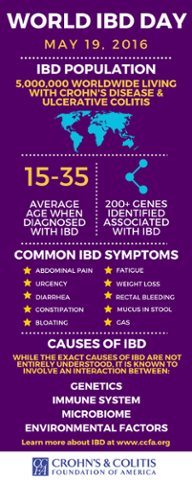When people think of Crohn’s disease and ulcerative colitis, they usually think, “it’s just a bathroom disease” or “it’s just a bad stomach ache.” What they don’t consider is the multitude of ways that inflammatory bowel diseases (IBD) impact the 5 million people worldwide living with these diseases.
Crohn’s disease and ulcerative colitis are painful, medically incurable diseases that attack the digestive system. Crohn’s disease may attack anywhere along the digestive tract, while ulcerative colitis inflames only the large intestine (colon). Many patients require numerous hospitalizations and surgery. Most people develop the diseases between the ages of 15 and 35; however the incidence is increasing in children.

May 19 is acknowledged around the globe as World IBD Day – a day to raise awareness of Crohn’s disease and ulcerative colitis and help educate the public about how debilitating these incurable digestive diseases can be. It’s a day to not only explain what these diseases are, but to also illustrate all of the ways these diseases can affect a patient – physically, emotionally, and financially.
In order to raise awareness, we wanted to dispel some common IBD myths:
1) IBD is just a bathroom disease.
This couldn’t be further from the truth. While Crohn’s disease and ulcerative colitis are located within the gastrointestinal tract, they can impact a person’s entire body. It is estimated that 25-40 percent of IBD patients experience complications outside of the GI tract. These complications can occur in the skin, joints, eyes, bones, mouth, liver, and kidneys.
For instance, Aaron was diagnosed with Crohn’s in 2009 when he was 17 years old. He was immediately put on steroids and shortly thereafter, his doctors found that the tissue in his hip bones died due to a lack of blood supply. Aaron was diagnosed with a condition called Avascular Necrosis (AVN), which is extremely rare and affects fewer than 200,000 people in the United States.
When he was 20, Aaron underwent a series of three hip surgeries, including two total hip replacements. Unfortunately, this year Aaron’s hip prosthetic failed, causing him to dislocate his hip. In March, he had surgery to replace his left hip prosthetic and lengthen his leg. He will undergo the same surgery later this year on his right leg. While Aaron’s situation is extremely rare, it illustrates how these diseases can wreak havoc throughout your body..
2) IBD and IBS are the same.
Although irritable bowel syndrome (IBS) and IBD can produce some similar symptoms, they ARE NOT the same. IBS is a functional bowel disorder that doesn’t cause lasting damage. IBD is a chronic autoimmune digestive disease that causes permanent damage to the gastrointestinal tract. IBD can cause debilitating complications, both in and out of the gut. The main complications of IBS are discomfort and impaired quality of life. Many patients require surgery to treat IBD; however, surgery is not used to treat IBS. Approximately 20 percent of patients with IBD can have concurrent IBS symptoms.
3) IBD is curable.
Crohn’s disease is medically incurable. The disease can sometimes be managed with medication and surgery, but patients will live with it their entire lives. Some in the medical field believe that ulcerative colitis can be “cured” with the surgical removal of the entire colon or large intestine. While this may eradicate the disease in the colon, it does not cure the underlying inflammatory condition, and patients can still have other complications as a result of the surgery.
Brooke is an example of this. Diagnosed with ulcerative colitis in 2008 when she was 24, she underwent surgery in 2012 to remove her colon. After living with a colectomy (surgical removal of all or part of your colon) for several months, Brooke had a second surgery to create a j-pouch (surgically constructed internal reservoir). Following her surgery, Brooke began experiencing debilitating pain, to the point where she couldn’t walk. She went to see her doctor and was diagnosed with Ankylosing Spondylitis (severe spinal arthritis) in 2014. Despite no longer having her colon, Brooke is still on medication for her disease and feels its impact on her life every day.
4) IBD can be treated with diet.
For patients living with inflammatory bowel diseases (IBD), diet can be a difficult area to navigate. IBD is not caused by eating any one particular food, but certain foods may aggravate symptoms in some patients. While dietary modifications can help manage disease symptoms, it cannot cure disease.
Additionally, there have been few well-designed clinical trials aimed at guiding dietary modifications to help manage symptoms and inflammation in patients with IBD. To address this lack of data, CCFA was recently awarded $2.5 million from the Patient-Centered Outcomes Research Initiative (PCORI) to study two dietary interventions (specific carbohydrate diet and Mediterranean-style diet) and their potential effectiveness in managing symptoms and inducing remission in patients with Crohn’s disease. Through this study, we hope to understand more about the role diet plays in treatment of IBD.
5) IBD is all in your head.
This might be the most upsetting myth our patients hear. Because of the invisible aspect of these diseases, many patients are often told that what they are experiencing is all in their head. In fact, it is estimated that the average patient is misdiagnosed two times before receiving a diagnosis of Crohn’s disease or ulcerative colitis.
Being told that the disease and symptoms are all in your head not only minimizes what patients are feeling, but it also supports the stigma around bowel diseases that already alienates our patients.
On World IBD Day, let’s take the time to educate not only ourselves but also the general public about what IBD is and its impact on a patient’s entire body and mind. Together, we can change public perception of these debilitating digestive diseases.
Do your part to help raise awareness on World IBD Day. Change your social media profile photo with our Twibbon or sign the CCFA in Action Volunteer Pledge and pledge to give back to the IBD community.
